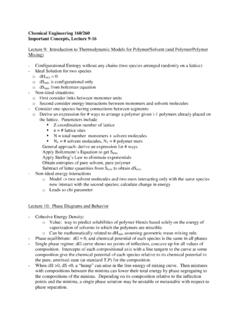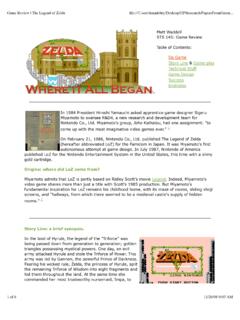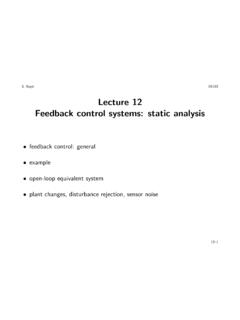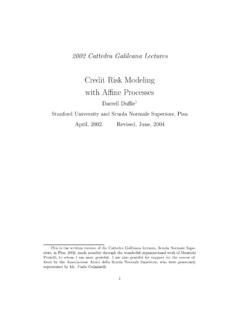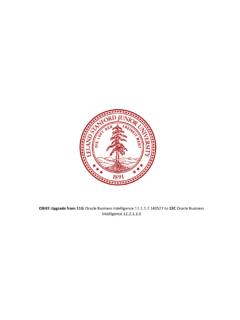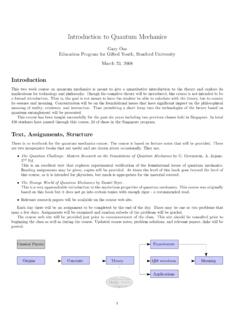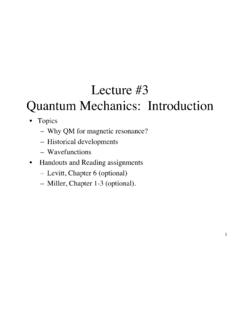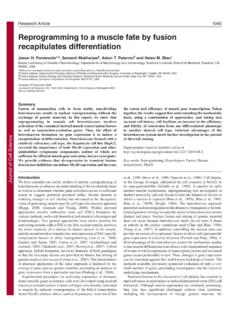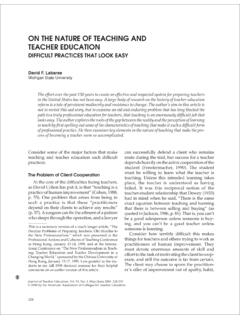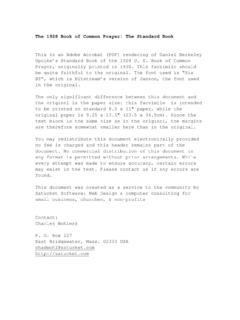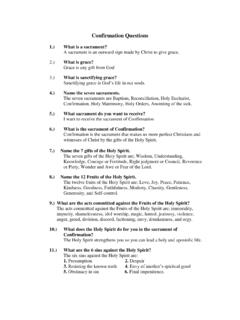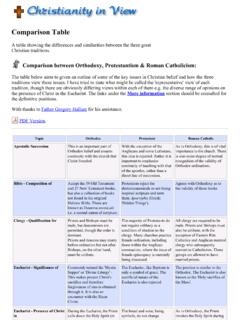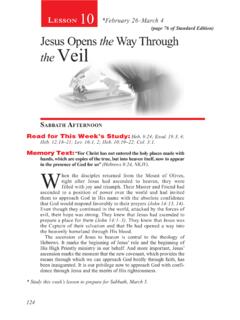Transcription of by Martin Luther THE THREE WALLS OF THE ROMANISTS
1 Open Letter to the Christian Nobility of the German Nation Concerning the Reform of the Christian Estate (1520)1by Martin LutherTHE THREE WALLS OF THE ROMANISTSThe Romanists2, with great adroitness, have built THREE WALLS about them, behind which they have hitherto defended them-selves in such wise that no one has been able to reform them; and this has been the cause of terrible corruption throughout all , when pressed by The temporal power, they have made decrees and said that the temporal power has no jurisdiction over them, but, on the other hand, that the spiritual is above the temporal power. Second, when the attempt is made to re-prove them out of the Scriptures, they raise the objection that the interpretation of the Scriptures belongs to no one except the pope. Third, if threatened with a council, they answer with the fable that no one can call a council but the this wise they have slyly stolen from us our THREE rods, that they may go unpunished, and have ensconced themselves within the safe stronghold of these THREE WALLS , that they may practice all the knavery and wickedness which we now see.
2 Even when they have been compelled to hold a council they have weakened its power in advance by previously binding the princes with an oath to let them remain as they are. Moreover, they have given the pope full authority over all the decisions of the council, so that it is all one whether there are many councils or no councils, -- except that they deceive us with puppet-shows and sham-battles. So terribly do they fear for their skin in a really free council! And they have intimidated kings and princes by making them believe it would be an offense against God not to obey them in all these knavish, crafty God help us, and give us one of the trumpets with which the WALLS of Jericho were overthrown, that we may blow down these WALLS of straw and paper, and may set free the Christian rods for the punishment of sin, bringing to light the craft and deceit of the devil, to the end that through punishment we may reform ourselves, and once more attain God's the first wall we will direct our first is pure invention that pope, bishops, priests and monks are to be called the "spiritual estate"; princes, lords, artisans, and farmers the "temporal estate.
3 " That is indeed a fine bit of lying and hypocrisy. Yet no one should be frightened by it; and for this reason -- viz., that all Christians are truly of the "spiritual estate," and there is among them no difference at all but that of office, as Paul says in I Corinthians 12:12, We are all one body, yet every member has its own work, where by it serves every other, all because we have one baptism, one Gospel, one faith, and are all alike Christians; for baptism, Gospel and faith alone make us "spiritual" and a Christian that a pope or a bishop anoints, confers tonsures; ordains, consecrates, or prescribes dress unlike that of the laity, this may Open Letter to the Christian Nobility - Luther11 Adapted from the translation of C. M. Jacobs (Works of Luther , Philadelphia: A. J. Holman Company, 1915), found online at: .2 The term "Romanist" is applied by Luther to the champions of the extreme form of papal hypocrites and graven images, but it never makes a Christian or "spiritual" man.
4 Through baptism all of us are con-secrated to the priesthood, as St. Peter says in I Peter 2:9, "Ye are a royal priesthood, a priestly kingdom," and the book of Revelation says, Rev. 5:10 "Thou hast made us by Thy blood to be priests and kings." For if we had no higher consecration than pope or bishop gives, the consecration by pope or bishop would never make a priest, nor might anyone either say mass or preach a sermon or give absolution. Therefore when the bishop consecrates it is the same thing as if he, in the place and stead of the whole congregation, all of whom have like power, were to take one out of their number and charge him to use this power for the others; just as though ten brothers, all king's sons and equal heirs, were to choose one of themselves to rule the inheritance for them all, -- they would all be kings and equal in power, though one of them would be charged with the duty of make it still clearer.
5 If a little group of pious Christian lay-men were taken captive and set down in a wilderness , and had among them no priest consecrated by a bishop, and if there in the wilderness they were to agree in choosing one of them-selves, married or unmarried, and were to charge him with the office of baptizing, saying mass, absolving and preaching, such a man would be as truly a priest as though all bishops and popes had consecrated him. That is why in cases of necessity any one can baptize and give absolution, which would be im-possible unless we were all priests. This great grace and power of baptism and of the Christian Estate they have well-nigh de-stroyed and caused us to forget through the canon It was in the manner aforesaid that Christians in olden days chose from their number bishops and priests, who were afterwards confirmed by other bishops, without all the show which now obtains.
6 It was thus that Sts. Augustine, Ambrose and Cyprian became , then, the temporal authorities are baptized with the same baptism and have the same faith and Gospel as we, we must grant that they are priests and bishops, and count their office one which has a proper and a useful place in the Chris-tian community. For whoever comes out the water of baptism can boast that he is already consecrated priest, bishop and pope, though it is not seemly that every one should exercise the office. Nay, just because we are all in like manner priests, no one must put himself forward and undertake, without our con-sent and election, to do what is in the power of all of us. For what is common to all, no one dare take upon himself without the will and the command of the community; and should it happen that one chosen for such an office were deposed for malfeasance, he would then be just what he was before he held office.
7 Therefore a priest in Christendom is nothing else than an office-holder. While he is in office, he has precedence; when Open Letter to the Christian Nobility - Luther23 The canon law, called by Luther throughout this treatise and elsewhere, the "spiritual law," is a general name for the decrees of councils and decisions of the popes, promulgated by authority of the popes. It comprised the whole body of Church law, and embodied in legal forms the medieval theory of papal absolutism, which accounts for the bitterness with which Luther speaks of it, especially in this , he is a peasant or a townsman like the rest. Beyond all doubt, then, a priest is no longer a priest when he is de-posed. But now they have invented characters indelebilis,4 and prate that a deposed priest is nevertheless something different from a mere layman. They even dream that a priest can never become a layman, or be anything else than a priest.
8 All this is mere talk and man-made all this it follows that there is really no difference be-tween laymen and priests, princes and bishops, "spirituals" and "temporals," as they call them, except that of office and work, but not of "estate"; for they are all of the same estate, -- true priests, bishops and popes, -- though they are not all engaged in the same work, just as all priests and monks have not the same work. This is the teaching of St. Paul in Romans 12:4 and I Corinthians 12:12, and of St. Peter in I Peter 2:9, as I have said above, viz., that we are all one body of Christ, the Head, all members one of another. Christ has not two different bodies, one "temporal ," the other "spiritual." He is one Head, and He has One , just as Those who are now called "spiritual" -- priests, bishops or popes -- are neither different from other Christians nor superior to them, except that they are charged with the administration of the Word of God and the sacra-ments, which is their work and office, so it is with the temporal authorities, -- they bear sword and rod with which to punish the evil and to protect die good.
9 A cobbler, a smith, a farmer, each has the work and office of his trade, and yet they are all alike consecrated priests and bishops, and every one by means of his own work or office must benefit and serve every other, that in this way many kinds of work may be done for the bod-ily and spiritual welfare of the community, even as all the members of the body serve one , now, how Christian is the decree which says that the tem-poral power is not above the "spiritual estate" and may not punish it. That is as much as to say that the hand shall lend no aid when the eye is suffering. Is it not unnatural, not to say un-christian, that one member should not help another and pre-vent its destruction? Verily, the more honorable the member, the more should the others help. I say then, since the temporal power is ordained of God to punish evil-doers and to protect them that do well, it should therefore be left free to perform it office without hindrance through the whole body of Christen-dom without respect of persons, whether it affect pope, bish-ops, priests, monks, nuns or anybody else.
10 For if the mere fact that the temporal power has a smaller place among The Chris-tian offices than has the office of preachers or confessors, or of the clergy, then the tailors, cobblers, masons, carpenters, pot-boys, tapsters, farmers, and all the secular tradesmen, should also be prevented from providing pope, bishops, priests and monks with shoes, clothing, houses, meat and drink, and from paying them tribute. But if these laymen are allowed to do their work unhindered, what do the Roman scribes mean by their laws, with which they withdraw themselves from the ju-risdiction of the temporal Christian power, only so that the may be free to do evil and to fulfill what St. Peter has said: 2. Peter 2:1 "There shall be false teachers among you, and through Open Letter to the Christian Nobility - Luther34 The character indelebilis, or "indelible mark," received authoritative statement in the bull Exultate Deo (1439): "Among these sacraments there are THREE -- baptism, confirmation, and orders -- which indelibly impress upon the soul a character, , a certain spiritual mark which distinguishes them from the rest.
